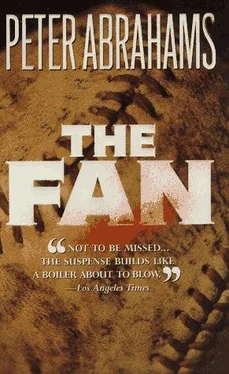Peter Abrahams - The Fan
Здесь есть возможность читать онлайн «Peter Abrahams - The Fan» весь текст электронной книги совершенно бесплатно (целиком полную версию без сокращений). В некоторых случаях можно слушать аудио, скачать через торрент в формате fb2 и присутствует краткое содержание. Жанр: Триллер, на английском языке. Описание произведения, (предисловие) а так же отзывы посетителей доступны на портале библиотеки ЛибКат.
- Название:The Fan
- Автор:
- Жанр:
- Год:неизвестен
- ISBN:нет данных
- Рейтинг книги:4 / 5. Голосов: 1
-
Избранное:Добавить в избранное
- Отзывы:
-
Ваша оценка:
- 80
- 1
- 2
- 3
- 4
- 5
The Fan: краткое содержание, описание и аннотация
Предлагаем к чтению аннотацию, описание, краткое содержание или предисловие (зависит от того, что написал сам автор книги «The Fan»). Если вы не нашли необходимую информацию о книге — напишите в комментариях, мы постараемся отыскать её.
The Fan — читать онлайн бесплатно полную книгу (весь текст) целиком
Ниже представлен текст книги, разбитый по страницам. Система сохранения места последней прочитанной страницы, позволяет с удобством читать онлайн бесплатно книгу «The Fan», без необходимости каждый раз заново искать на чём Вы остановились. Поставьте закладку, и сможете в любой момент перейти на страницу, на которой закончили чтение.
Интервал:
Закладка:
A cool bland process server. Ellen had hit him when he was down. Every muscle in his body went tense, frozen between need for action and ignorance of what that action might be. Gil stood in the mud outside Boucicaut’s trailer, with the pressure building and building inside, until he thought he might just die there, and it would be a good thing; and then he remembered the thrower, strapped to his leg.
The next moment he had it in his hand, a work of art, but also an ugly little bugger, as Mr. Hale had said. Gil flung it at a tree across the yard, ten yards away, perhaps farther. The knife missed the trunk completely, flashing into the woods and out of sight.
Gil went after it, found it lying on a wet pile of leaves, returned to the tree he had missed. A red maple; he could tell by the few dead leaves that had held onto its branches all winter. Gil inscribed a circle at chest height, the size of the deer heart Boucicaut had cut out, or a little bigger. He measured fifteen paces across the yard, hefted the knife. Perfectly balanced to rotate around its midpoint, maximum effective distance for a one-and-a-half-turn, handle-to-point throw forty-two to forty-eight feet, taking into account the extent of the sticking range. Front foot forward, leg flexed, elbow bent, wrist locked, knife behind the head.
Gil let go, careful to keep his wrist still until the follow-through, careful to aim high, allowing for gravity. The knife spun through the air one and a half times and stuck in the trunk, two or three inches to the right of the circle, blade pointing up at a forty-five-degree angle. Gil retrieved it and tried again, monitoring the movements of his arm more closely this time.
Stick: on the outside of the circle, blade pointing down at about thirty degrees.
And again: Dead center, blade at a right angle.
And once more: Dead center, blade at a right angle.
For Ellen: Same.
And Tim: Same.
And Figgy: Same.
And Bridgid: Same.
And the busybody old lady in the Harvard cap: Same.
And who else?
Bobby Rayburn: Missed.
Bobby Rayburn: Missed.
Gil cried out, alone in the clearing, night falling around him, no words, just a noise tearing up from his chest, through his throat, out his mouth.
Bobby Rayburn, who had humiliated him in front of his kid, face it, face it, face it: Bull’s-eye.
Bobby Rayburn: Bull’s-eye.
Bobby Rayburn, Bobby Rayburn, Bobby Rayburn: harder, harder, harder: same, same, same.
It was springtime. Sap ran down the trunk of the red maple like blood.
13
Boucicaut came back in a good mood, bursting into the trailer with Gil’s car keys in one hand and a pint of something in the other. It was raining hard now, pounding on the flat roof, and Gil hadn’t heard him drive up. He slipped off the catcher’s mitt and set it on the table.
“Nice wheels, old buddy,” said Boucicaut, flipping him the keys. He glanced around. “You didn’t light the stove?” Boucicaut knelt, opened the blackened stove door, tossed in sticks of wood and scraps of paper, struck a match. “Don’t tell me you’re turning into a city boy.” Flames shot up inside the stove.
“I wasn’t cold,” Gil said.
“Tough guy, I forgot,” said Boucicaut. “Good thing.”
“Good thing?”
“ ’Cause we’ll be spending time outside tonight. If you can lend me a hand, that is.”
“Doing what?”
“Nothing much.” Boucicaut took a hit from the pint bottle, passed it to Gil.
Canadian. Gil didn’t like Canadian. He drank some anyway. Sour and harsh, compared to Mr. Hale’s Scotch, but it felt good going down. He realized that he was indeed cold, and had some more.
“Know your muffler was gone?” asked Boucicaut.
Gil nodded.
“Not to worry. It’s all fixed.”
“It’s all fixed?” said Gil; he didn’t have the money for new mufflers.
“And there was a little bumper problem. That’s fixed too.”
“What do I owe you?” asked Gil. Right words but wrong sound: he was instantly aware of the dismay in his tone, of failing to sound successful.
“All taken care of.”
“I can’t let you do that.”
“Do what?” said Boucicaut. “Didn’t cost a cent.”
“How’s that?”
“Friend of mine’s got a lot of spare parts and a welding torch.” Boucicaut kicked the wood-stove door closed with the toe of his boot.
What kind of friend had mufflers for a 325i hanging around? Gil was wondering whether to ask or just let it slide, when Boucicaut noticed the baseball gloves on the table. “Where’d you find those?”
“In the closet,” said Gil. He waited for Boucicaut to ask what he’d been doing in the closet.
But Boucicaut did not. He just took another drink from the bottle, and handed it to Gil.
Gil finished the bottle. It went to his head, hot, harsh, challenging. “What did you want me to help you with?”
“No big deal,” said Boucicaut. He went to the table, picked up the trophy, turned it in his hand. “You like practical jokes, right?”
“Depends.”
They took Gil’s car, Gil driving, Boucicaut navigating. The scraping sound was gone, the car again riding as quietly as it had the day he’d driven it off the lot. They drove west, out of town, into the storm.
“What are you sniffing at?” Boucicaut said.
“Nothing. Where are we going?”
“Ski country,” said Boucicaut. He had another pint. They passed it back and forth. “I bet you’re a skier, Gilly. Successful guy like you.”
“No.”
“Golf? Tennis?”
“No.”
“Thought all you corporate dudes were into shit like that.”
Gil felt a strong urge to confess that he wasn’t a corporate dude, that he didn’t even have a job, that he was done: to spill everything to Boucicaut. He overcame it. “Too busy,” he said.
Boucicaut laughed and clapped him on the shoulder, hard. “Too busy makin’ money, right? Son of a bitch. How much’re you worth, anyway?”
“Give me a fucking break.” Gil realized he had shouted the words.
There was a silence. Then Boucicaut said, “Easy, old buddy.”
They climbed out of the rain and into falling snow, up in the highlands where winter lingered. Ahead lay the light of the access road, and beyond it the mountain, the top a shadow in the night, the bottom lit like a pearl for night skiing. It was all new to Gil, not just the development: even the shape of the mountain had changed.
“Hang a right,” said Boucicaut.
Gil turned onto a road barely wide enough for two cars to pass. It mounted a rise, swung into thick woods, and then began climbing steeply up and out of sight, around the side of the mountain. The tires whined in the mix of mud and snow. Gil stopped the car.
“We’ll never get up that.”
“Sure we will,” said Boucicaut. “Just pop the trunk.”
“What for?”
“So I can get the chains.”
“I don’t have chains.”
Boucicaut laughed and got out. Gil popped the trunk. In the rearview mirror he watched Boucicaut, reddened by the taillights, pulling out a set of chains. Gil felt questions stirring in his mind, raising their heads like sea worms in the sand, only to be flattened by a calming wave: Boucicaut was taking charge.
Boucicaut got back in the car, slamming the door on a swirling funnel of snow. “Let’s go.”
Gil drove up the side of the mountain, the chains digging in like teeth. After a few condo clusters came the chalets, at first close together and big, later farther apart and enormous, almost all of them shining an outside light or two, but dark within.
“This is where the New Yorkers stay,” said Boucicaut. “Jews. They never come up this time of year, no matter how much snow’s left. Cut the lights.”
Читать дальшеИнтервал:
Закладка:
Похожие книги на «The Fan»
Представляем Вашему вниманию похожие книги на «The Fan» списком для выбора. Мы отобрали схожую по названию и смыслу литературу в надежде предоставить читателям больше вариантов отыскать новые, интересные, ещё непрочитанные произведения.
Обсуждение, отзывы о книге «The Fan» и просто собственные мнения читателей. Оставьте ваши комментарии, напишите, что Вы думаете о произведении, его смысле или главных героях. Укажите что конкретно понравилось, а что нет, и почему Вы так считаете.












